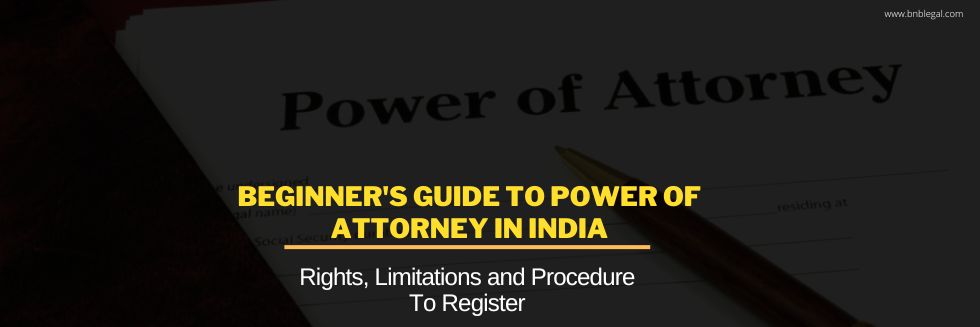Is there any legal option to allow someone to act on your behalf? Can someone else take legal decisions for you when you allow them to? The answer is yes. You can allow a person to take different major decisions for you including financial and legal. For that, you can go for the legal instrument “power of attorney”. But what do you mean by a power of attorney? What are the rights and limitations of a power of attorney? In order to answer all your questions, here is a beginner’s guide to power of attorney in India.
What Is A Power Of Attorney?
Many times, we think that there should be a person who should work on our behalf when we don’t have the energy to step out. Do you know that there is a legal remedy through which we can authorize another person to take major decisions in our life? A power of attorney is a legal instrument or arrangement that allows one person to act on behalf of another. Unfortunately, this doesn’t aim at fulfilling your lazy desires to bring your grocery or stand in a queue for you but to take some serious decisions on your behalf. It is governed by the Powers of Attorney Act, 1882.
As per Section 1A of The Powers Of attorney Act of 1882, a POA includes any instrument empowering a specified person to act for and in the name of the person executing it.
As per Section 2(21) Indian Stamp Act 1899, Power-of-attorney includes any instrument (not chargeable with a fee under the law relating to court-fees for the time being in force) empowering a specified person to act for and in the name of the person executing it.
Most of the time, this power is given in connection to property matters. However, the person might be entrusted to perform certain other responsibilities too. It is an authority given by a person/grantor/principal to an agent or agents. This instrument allows a person to appoint another person or organization to manage his/her property, medical affairs, and finances on his behalf in his absence. A POA holder is an agent as to Section 182 of the Indian Contract Act, 1872.
Usually, people appoint a power of attorney for property matters. However, it can also be done to handle finances and health affairs. It depends on the grantor how much authority he/she wants to give to their power of attorney.
Types Of Power Of Attorney In India
In India, there are two main types of power of attorney: General Power of Attorney (GPA) and Special Power of Attorney (SPA).
General Power of Attorney: A General Power of Attorney is a legal document that allows an individual (the principal) to authorize another person (the attorney) to act on their behalf in various matters. This type of power of attorney is typically used for a wide range of activities such as managing property, signing legal documents, and conducting business transactions.
Special Power of Attorney: A Special Power of Attorney, on the other hand, is a more specific legal document that grants the attorney specific powers and authority to act on the principal’s behalf. This type of power of attorney is typically used for specific tasks such as signing legal documents, managing property or representing the principal in court.
It is important to note that both general power of attorney and special power of attorney are revocable, which means that the principal can revoke or cancel the power of attorney at any time.
Durable Power of Attorney: This is a power of attorney that remains in effect even if the principal becomes incapacitated or unable to make decisions for themselves.
Medical Power of Attorney: This is a legal document that allows an individual to authorize another person to make medical decisions on their behalf in case they become unable to make their own medical decisions.
Limited Power of Attorney: This type of power of attorney grants the attorney specific powers and authority to act on the principal’s behalf for a limited time period or specific purpose.
NRI Power of Attorney: This type of power of attorney is used by Non-Resident Indians (NRIs) to authorize someone to handle their legal and financial matters in India while they are abroad.
It is also important to note that all power of attorney will be valid only if it is executed as per the Indian Registration Act, 1908 and registered with the Sub-Registrar of Assurances.
Important Clauses In A Power Of Attorney
- The name, age, address and occupation of the person who makes the Power of Attorney, the Principal.
- The person to whom the power is granted, the Attorney.
- The reason for granting the power of Attorney which should be legally valid.
- The date and place of making the Power of Attorney deed and the date from which it comes into force.
- The date of termination of the power of Attorney if it is limited by time. If no time is specified mention whether the Power of Attorney is durable or non-durable.
- If it is a general power granted then all the acts and areas of granting the power should be mentioned clearly. Whether any particular act is not to be done by the Attorney in certain areas should be specified. For example, If general power for property is granted, the Principal can grant the power to buy or rent any property but may not grant the power to sell any of his property.
- In Special power of Attorney, the specific or particular act or task that needs to be done and completed by the Attorney is to be clearly mentioned. Also, the time limit within which that act is to be done is also to be specified.
How to Create a Power of Attorney?
Creating a power of attorney in India requires several steps and it is important to ensure that all legal requirements are met. Here’s an overview of how to create a power of attorney in India:
Choose an Attorney: The first step is to choose a person who will act as your attorney. This person should be trustworthy and able to carry out the tasks outlined in the power of attorney.
Draft the document: Once you have chosen an attorney, you need to draft the power of attorney document. The document should include the following details: the name and address of the principal, the name and address of the attorney, the powers and authority being granted to the attorney, the effective date of the power of attorney, and the signature of the principal.
Notarization: The power of attorney document must be notarized by a Notary Public. The notary will verify the identity of the principal and the attorney, and will then affix their seal and signature to the document.
Witnessing: The power of attorney document must be signed by two witnesses. The witnesses should be independent and should not be related to either the principal or the attorney.
Registration: The power of attorney document must be registered with the Sub-Registrar of Assurances in the area where the property is located. It is important to ensure that the power of attorney is registered, as an unregistered power of attorney will not be valid.
Keep a copy: It is important to keep a copy of the power of attorney document for your records.
Rights Of A Power Of Attorney In India
A power of attorney is a legal instrument or written authorization to appoint a person to represent a person in his/her private affairs which can be financial or related to health and welfare. It can also be opted for in the business or in some other legal matters. Generally, it is executed in case of an illness, aging, a disability, or simply being away for an extended period of time. So, you might be wondering what decisions can be made by power of attorney. What are the rights of a power of attorney?
Here is the list of powers that a POA may have.
- Right to perform all the activities that are authorized by the grantor.
- Right to take legal action on the behalf of Principal.
- Can sign the legal documents which the grantor has authorized him/her to.
- Can receive payments on behalf of the Principal.
- POA has the right to lease, collect rentals, grant, bargain, sell, or borrow and mortgage.
- Has the authority to make decisions in personal, business, or investment affairs.
- Create bank accounts and make cheques.
- He/she can be authorized to execute contracts, deeds, bonds, mortgages, notes, checks, drafts, money orders.
- A grantor can allow the POA to sell stocks, bonds, and other investments.
- Can sell property on behalf of the Principal.
- The Power of Attorney has the right to handle, compromise, resolve and modify real estate-related issues.
- An agent may be authorized to pay the principal’s rent or mortgage, hire workers to maintain the principal’s home, or hire an attorney to represent the principal.
- A healthcare POA can make the decision related to the principal’s medical needs which should be made responsibly. Despite differentiating opinions, the agent must act according to the principal’s intentions.
- The person in charge can authorize an agent to conduct multiple tasks, such as signing agreements, managing assets, managing finances and taxes, and organizing living and medical needs, through one or more legal documents known as powers of attorney.
- POA should keep a record of all financial statements. Not just receipts, but also a complete transactional history of all transactions performed must be recorded.
- The expenses related to support, education, and care of legal dependents are made from the grantor’s property.
- A POA can take action on behalf of the principal.
Limitations Of A Power Of Attorney
- A POA must not go beyond the scope of powers granted under the Power of Attorney document. In such cases, the attorney can be held liable for any kind of harm that the grantor or others incur.
- In case of any kind of breach, the attorney will be held responsible unless POA behaved reasonably.
- He/she cannot delegate the authority to some other person to behave as an agent.
- An agent cannot act against the best interest of the principal.
- The powers of the POA to make financial or legal decisions end as soon as the Principal dies and the Executor of the State assumes control.
- After the grantor’s death, the attorney will not be able to disburse inheritances or transfer assets.
- A power of attorney can only be legally executed by someone who is mentally and physically capable.
- Has no authority to alter or nullify the Will or other Estate Planning papers of a principal.
- A POA can be held liable for fraud or carelessness if he/she alters or breaches the provisions of the nomination paperwork.
- An attorney is not allowed to use the money or assets of the principal as if they are their own.
- Only the stipulated amount in the document should be paid to the POA.
- Adding more to “what all decisions a power of attorney cannot make”, an attorney cannot give big financial gifts, take decisions on their related to discretionary funds, do tax planning, misuse power for personal interests and can’t transfer money to their own account.
- In the case of hiring a Power of Attorney for health and welfare purposes, a POA cannot restrict the grantor’s freedom about his/her health and medical POA will not come into effect until the grantor is conscious and of sound mind and body.
Documents Required For Power Of Attorney In India
- A “Power of Attorney” document outlining the specific powers being granted by the principal (the person granting the power of attorney) to the attorney-in-fact (the person receiving the power of attorney).
- A document identifying the principal and the POA, including their names, addresses, and signatures.
- Two passport-size photographs of both the grantor and POA.
- Proof of the principal’s identity, such as a passport, voter ID card or PAN card.
- Proof of the attorney’s identity, such as a passport or voter ID card.
- Two witnesses will also need to provide proof of identity and sign the power of attorney document.
- Notarization of the document, by a notary public or a lawyer.
Registration Of Power Of Attorney
Is registration of power of attorney compulsory in India?
Though it is not mandatory to register a power of attorney in India, it is advisable that you opt for it to maintain its authenticity. Also, if it is executed in respect of immovable property worth more than INR 100 in value, it is necessary to register it. It doesn’t require compulsory registration under Section 17(1)(b) of the Indian Registration Act, 1908.
A well-drafted POA is submitted before the Sub-Registrar of the concerned jurisdiction. It should be drafted on a stamp paper of appropriate value. The document should be submitted before Sub-Registrar with all required documents including proof of ownership, proof of residence and proof of identity. In addition to the principal’s and agent’s address proofs, the two witnesses should also have their identity proofs with them. In addition to the details about authorisation delegated, it should also contain the full name, address, passport details, and AADHAAR Card details of both, the principal and the POA holder.
Power Of Attorney For NRIs
The document has gained popularity majorly in the context of Non-Resident Indians. NRIs prefer or have to prefer to authorise a person to handle their legal affairs in India to avoid the hassle of visiting the country again and again. Luckily, there exists a legal instrument that eases things for NRIs in India.
Most probably, people do appoint a POA for property matters. power of attorney for NRI to sell property in India. The NRI grantor doesn’t have to be in India for the registration or execution of the POA. The process can be completed in their domicile through the Indian embassy.
There are two ways to register a POA for NRIs which include Legalisation and Apostalisation.
Legalisation
Through this, the signature of the judge/notary who witnesses the signing/execution of the POA must be verified by a representative accredited by the Indian Embassy/Consulate. Section 3 of the Diplomatic and Consular Officers (Oaths and Fees) Act, 1948, notarising a deed from an authorised officer of the Indian Consulate/Embassy would be considered a valid notary. Such POA document need not be stamped at the time of execution. However, it needs to be stamped within three months of receipt of POA in India. The stamp duty will be payable as per Section 2(17) read with Schedule-I of the Indian Stamp Act, 1899, when it is presented for registration in India.
Apostalisaton
A POA can be executed through apostalisation which is governed by Hague Convention, 1961. An Apostille is a certificate which is required that confirms and verifies the signature of the person who executed the deed. The document should be in accordance with the Indian Registration Act, 1908, and the Power of Attorney Act, 1882. Then, the stamp duty is charged after receiving the document.
What Is A Revocable Power Of Attorney?
In addition to the principal’s right to terminate a power of attorney at any stage, here are a few conditions for revocation by virtue of Section 201 of the Indian Contract Act, 1872.
- When the Principal or POA holder or both become of unsound of mind, die or is/are adjudicated as insolvent by the court.
- If the POA holder renounces his power.
- When the purpose of the power of attorney has been accomplished.
Irrevocable Power Of Attorney
To execute an irrevocable power of attorney, the document should contain a clause stating that this power of attorney is irrevocable. In order to revoke such power of attorney, the principal has to issue a public notice through local newspapers.
There can be some conditions where the principal alone cannot revoke a POA. When the agent himself has a special interest in the power of attorney’s subject matter, consent of the POA holder is required.
As per Section 202 of the Indian Contract Act, 1872, “Where the agent has himself an interest in the property which forms the subject matter of the agency, the agency cannot, in the absence of an express contract, be terminated to the prejudice of such interest.”
How To Revoke/Cancel A Power Of Attorney In India?
Before knowing how, you should know when can a power of attorney be revoked. There is no explicit law that governs the revocation of a POA. Section 3 of The Power-Of Attorney Act 1882 also doesn’t define the same.
- The principal must draft a notice of revocation, stating the reason for the revocation, the effective date, and the consequences.
- The notice must be served to the agent.
- The notice should be published in a local or national newspaper to inform relevant parties.
- The authority that registered the initial POA must register the cancellation.
- A copy of the cancellation notice should be sent to the agent and relevant parties who have been dealing with the agent on behalf of the principal, to inform them of the revocation.
Situations Where Power of Attorney Gets Cancelled Automatically
A POA automatically gets cancelled in case of
- Agent’s death,
- Agent’s insanity
- Agent’s insolvency
- When the main purpose of executing a POA has come to an end
- If a person appoints his/her spouse or registered domestic partner as their agent under a power of attorney, their authority to act on their behalf will automatically end if they get divorced, legally separated, or their registered domestic partnership is terminated.
Supreme Court’s 2011 Judgment On Power Of Attorney
In 2011, Supreme Court declared, “a power of attorney is not an instrument of transfer in regard to any right, title or interest in an immovable property.” The bench directed the municipal bodies not to mutate or register properties based on such documents. However, the apex court reiterated that valid transactions carried out through GPA would be legal.
“Nothing prevents affected parties from getting registered deeds of conveyance to complete their title. The said transactions may also be used to obtain specific performance or to defend possession under Section- 53 A of the Transfer of Property Act, 1882,” the bench said.
Conclusion
In order to avoid the misuse of power of attorney and to maintain the authenticity of this instrument, make sure you consult the best lawyer near you who handles such matters. This article contains everything that you need to know about the power of attorney in India and the process to execute it. In addition to this guide to power of attorney in India, you need to hire an experienced lawyer to appoint a power of attorney. Because an advocate is a person who’ll guide you whether you need it or not. This will also ensure continuous support at every step to make it a secure experience for you.
This article is written by Varsha. You can reach out to the author via email at bnbvarsha@gmail.com.









